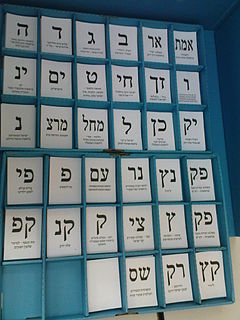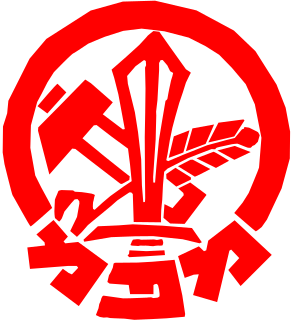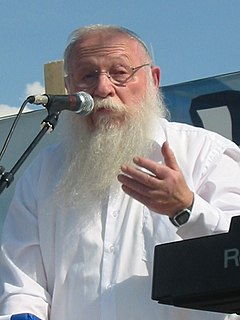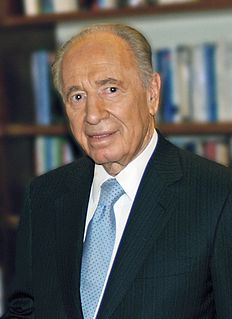
The Prime Minister of Israel is the head of government and chief executive of Israel.
Shinui was a Zionist, secular, and anti-clerical free market liberal party and political movement in Israel. The party twice became the third-largest in the Knesset, but both occasions were followed by a split and collapse; in 1977, the party won 15 seats as part of the Democratic Movement for Change, but the alliance split in 1978, and Shinui was reduced to two seats at the next elections. In 2003, the party won 15 seats alone, but lost them all three years later after most of its MKs left to form new parties. The party was a member of Liberal International until 2009.
Tehiya, originally known as Banai, then Tehiya-Bnai, was an ultranationalist political party in Israel. The party existed from 1979 until 1992. In the eyes of many, Tehiya was identified with Geula Cohen, who founded the party and headed it throughout its existence.

Yossi Sarid was an Israeli politician and news commentator. He served as a member of the Knesset for the Alignment, Ratz and Meretz between 1974 and 2006. A former Minister of Education and Minister of the Environment, he led Meretz between 1996 and 2003 and served as Leader of the Opposition from 2001 to 2003. Known for his determined moral stance and his willingness to pay the political price for that determination, Sarid was often referred to as Israel's moral compass.
The Democratic Movement for Change, commonly known by its Hebrew acronym Dash was a short-lived and initially highly successful centrist political party in Israel. Formed in 1976 by numerous well-known non-politicians, following a spectacular breakup, it had ceased to exist within less than two years.
Legislative elections were held in Israel on 17 May 1977 to elect the ninth Knesset. For the first time in Israeli political history, the right-wing, led by Likud, won a plurality of seats, ending almost 30 years of rule by the left-wing Alignment and its predecessor, Mapai. The dramatic shift in Israeli politics caused by the outcome led to it becoming known as "the revolution", a phrase coined by TV anchor Haim Yavin when he announced the election results live on television with the words "Ladies and gentlemen—a revolution!". The election saw the beginning of a period lasting almost two decades where the left- and right-wing blocs held roughly equal numbers of seats in the Knesset.

The Alignment is the name of two political alliances in Israel. Each of these Alignment parties later merged into what is now the Israeli Labor Party.
Ometz, originally Rafi – National List, then the National List was a small right-wing political party in Israel, which existed briefly in 1981, and then from 1983 until 1987. Though linked to it, it is considered a separate entity to the National List of the early 1970s.
Knesset elections were held in Israel on 30 June 1981. The ruling Likud won one more seat than the opposition Alignment, a surprise result as opinion polls and political momentum initially suggested that the Alignment would win roughly half of the votes while the Likud would only get twenty percent. Voter turnout was 78.5%, with Likud receiving around ten thousand more than the Alignment. This elections highlighted the polarization in the country.
Elections for the 12th Knesset were held in Israel on 1 November 1988. Voter turnout was 79.7%.
Morasha, later known as Morasha-Poalei Agudat Yisrael, was a small, short-lived religious political party in Israel during the 1980s.

The Leader of the Opposition is the politician who leads the Official Opposition in the Israeli legislative body, the Knesset.

The seventeenth government of Israel was formed by Yitzhak Rabin on 3 June 1974, following the resignation of Prime Minister Golda Meir on 11 April and Rabin's election as Labor Party leader on 26 April. It was the first time an Israeli government had been led by a native-born Israeli.

The twenty-second government of Israel was formed by Yitzhak Shamir of Likud on 20 October 1986. Shamir replaced Shimon Peres of the Alignment as Prime Minister as part of a rotation deal within the national unity coalition between the two parties. The only other change to the coalition was that the one-seat Morasha faction was not included, with the National Religious Party, Agudat Yisrael, Shas, Shinui and Ometz remaining part of the government, although Shinui left on 26 May 1987.

The twenty-fourth government of Israel was formed by Yitzhak Shamir of Likud on 11 June 1990. This followed the failure of Alignment leader Shimon Peres to form a government, after the Alignment had pulled out of the previous national unity coalition, in an incident which became known as the dirty trick.

The twenty-fifth government of Israel was formed by Yitzhak Rabin of the Labor Party on 13 July 1992, after the party's victory in the June elections. The coalition also contained the new Meretz party and Shas, and held 62 of the 120 seats in the Knesset. The government was also supported, but not joined, by Hadash and the Arab Democratic Party, which held an additional five seats between them.











